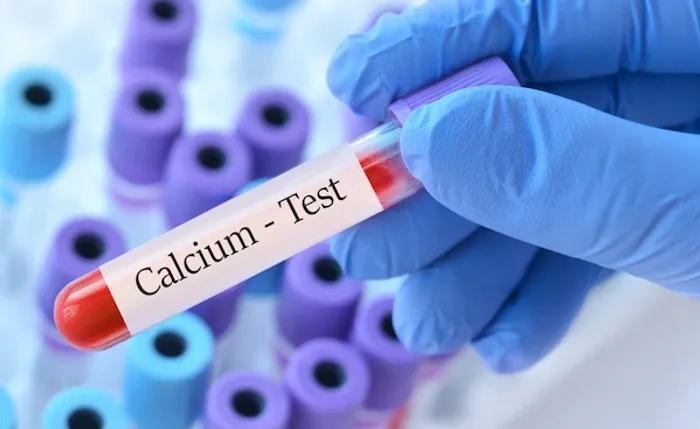Calcium Blood Test and Normal Range
Learn about the Calcium Blood Test, its purpose, normal range, and what abnormal levels may indicate. Understand how this test helps monitor bone health, parathyroid function, and overall wellbeing.

Written by Dr. J T Hema Pratima
Reviewed by Dr. Dhankecha Mayank Dineshbhai MBBS
Last updated on 2nd Sep, 2025

Introduction
Calcium is a vital mineral that plays a crucial role in keeping our bones strong, helping muscles contract, and ensuring nerves and the heart function properly. A calcium blood test is a simple way to check the level of calcium in your blood. This test helps doctors diagnose or monitor conditions related to bone health, kidney function, and certain gland disorders.
If you’ve been advised to get a calcium blood test or are curious about what the results mean, this article will guide you through everything you need to know, from why the test is done to how to maintain healthy calcium levels.
Why Is a Calcium Blood Test Done?
Your doctor may recommend a calcium blood test if you:
- Have symptoms of high or low calcium levels.
- Are being treated for conditions affecting calcium levels (like kidney disease or thyroid disorders).
- Are taking medications that can impact calcium (such as diuretics or vitamin D supplements).
- Have a history of bone disorders (like osteoporosis).
- Are undergoing certain cancer treatments.
This test helps detect imbalances early, allowing for timely treatment.
Consult a General Physician for the best advice
Symptoms of High or Low Calcium Levels
To help you recognize imbalances early, here are the common symptoms of high or low calcium levels:
High Calcium (Hypercalcaemia) Symptoms
- Fatigue and weakness
- Excessive thirst and frequent urination
- Nausea, vomiting, or constipation
- Bone pain or muscle aches
- Confusion or memory problems
Low Calcium (Hypocalcaemia) Symptoms
- Muscle cramps or spasms
- Numbness or tingling in fingers and toes
- Weak or brittle nails
- Irregular heartbeat
- Seizures (in severe cases)
If you experience any of these symptoms, consult your doctor; they may recommend a calcium blood test.
What Is the Normal Range for Calcium in Blood?
Calcium levels are measured in milligrams per decilitre (mg/dL). The normal range for adults is typically:
- Total Calcium: 8.5 to 10.2 mg/dL
- Ionized (Free) Calcium: 4.6 to 5.3 mg/dL (this is the active form of calcium in the blood)
Note: Slightly different ranges may apply for children and pregnant women. Your doctor will interpret your results based on your age, medical history, and other factors.
What Causes Abnormal Calcium Levels?
Several factors can influence calcium balance in the body. Here’s what may cause abnormal calcium levels:
High Calcium (Hypercalcaemia) Causes
- Hyperparathyroidism (overactive parathyroid glands)
- Vitamin D excess (from supplements or certain medications)
- Certain cancers (like lung or breast cancer)
- Kidney disease
- Dehydration
Low Calcium (Hypocalcaemia) Causes
- Vitamin D deficiency
- Kidney disease
- Hypoparathyroidism (underactive parathyroid glands)
- Magnesium deficiency
- Certain medications (like diuretics or chemotherapy drugs)
If your calcium levels are outside the normal range, your doctor may order additional tests to determine the underlying cause.
How to Maintain Healthy Calcium Levels
Maintaining the right balance of calcium is essential for strong bones and overall health. Here are some tips to support healthy calcium levels:
1. Eat Calcium-Rich Foods
Include these in your diet:
- Dairy products (milk, yoghurt, cheese)
- Leafy greens (spinach, kale)
- Fortified foods (orange juice, cereals)
- Nuts and seeds (almonds, chia seeds)
- Fish with bones (sardines, salmon)
2. Get Enough Vitamin D
- Vitamin D helps your body absorb calcium. Spend time in sunlight or consume foods like fatty fish, egg yolks, and fortified milk. If needed, your doctor may recommend supplements.
3. Stay Hydrated
- Dehydration can affect calcium levels. Drink plenty of water throughout the day.
4. Limit Excess Sodium and Caffeine
- Too much salt or caffeine can reduce calcium absorption. Moderation is key!
5. Exercise Regularly
- Weight-bearing exercises (like walking or strength training) help maintain strong bones.
When Should You Book a Calcium Blood Test?
If you have symptoms of calcium imbalance, a family history of bone disorders, or are on medications affecting calcium levels, consult your doctor. You can easily book a calcium blood test through Apollo 24|7 for a quick and hassle-free check-up.
Get Your Health Assessed
Final Thoughts
Calcium is essential for overall health, and keeping it balanced is important. If your calcium levels are too high or too low, early detection and treatment can prevent complications. Eating a balanced diet, staying active, and getting regular check-ups can help maintain healthy calcium levels.
Consult a General Physician for the best advice
Get Your Health Assessed
₹309(₹773)60% off
Consult a General Physician for the best advice

Dr. Chaithra H
General Physician/ Internal Medicine Specialist
6 Years • MBBS, MD General Medicine, DNB General Medicine
Bangalore
Apollo 24|7 Clinic - Karnataka, Bangalore

Dr. Jawwad Mohammed Kaleem
General Practitioner
4 Years • MBBS
Hyderabad
Apollo 24|7 Clinic, Hyderabad

Dr. M L Ezhilarasan
General Practitioner
6 Years • MBBS
Visakhapatnam
Apollo 24|7 Clinic - Andhra Pradesh, Visakhapatnam

Dr. Mohammed Kamran
General Practitioner
5 Years • MBBS, FIDM
Nashik
Apollo 24|7 Clinic - Maharashtra, Nashik

Dr Divya Lekha Gunta
General Practitioner
10 Years • MBBS, MD (Pathology)
Visakhapatnam
Apollo 24|7 Clinic - Andhra Pradesh, Visakhapatnam
Consult a General Physician for the best advice

Dr. Chaithra H
General Physician/ Internal Medicine Specialist
6 Years • MBBS, MD General Medicine, DNB General Medicine
Bangalore
Apollo 24|7 Clinic - Karnataka, Bangalore

Dr. Jawwad Mohammed Kaleem
General Practitioner
4 Years • MBBS
Hyderabad
Apollo 24|7 Clinic, Hyderabad

Dr. M L Ezhilarasan
General Practitioner
6 Years • MBBS
Visakhapatnam
Apollo 24|7 Clinic - Andhra Pradesh, Visakhapatnam

Dr. Mohammed Kamran
General Practitioner
5 Years • MBBS, FIDM
Nashik
Apollo 24|7 Clinic - Maharashtra, Nashik

Dr Divya Lekha Gunta
General Practitioner
10 Years • MBBS, MD (Pathology)
Visakhapatnam
Apollo 24|7 Clinic - Andhra Pradesh, Visakhapatnam
